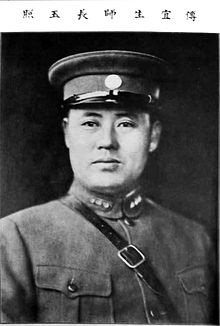Fu Zuoyi
Fu Zuoyi ( Chinese 傅作義 / 傅作义 , Pinyin Fù Zuòyì , W.-G. Fu Tso-i ; born June 27, 1895 in Ronghe , Linyi County, Shanxi Province ; † April 19, 1974 in Beijing ) was a commander in the army of Chinese warlord Yan Xishan , National Revolutionary Army general and politician of the People's Republic of China .
Fu attended Shanxi Army School, Beijing Qinghe Officers School, and Baoding Military Academy as a teenager, and then joined the army of warlord Yan Xishan, who controlled Fu's homeland. In this army he rose to one of the most capable commanders during the period of warlords, which he demonstrated in the defense of the enclosed city of Zhuozhou , which lasted from October 1927 to January 1928 . In 1927 he took part in the northern campaign in which Chiang Kai-shek attempted to unite politically divided China. Here, Fu was appointed commander of the Fifth Army and Tianjin Garrison . When Yan Xishan, Feng Yuxiang , Li Zongren and Wang Jingwei resisted in the war in the central plain of Chiang Kai-shek in 1930 , Fu conquered the city of Jinan against Chiang Kai-shek's troops from Shanxi , but was ultimately defeated. During this time, Fu became friends with Zhang Xueliang , who controlled Manchuria . Zhang appointed Fu governor of Suiyuan Province and let him lead the Suiyuan campaign in which Fu successfully prevented Japanese invasions of Manchukuo into Chahar Province . During the Second Sino-Japanese War , Fu served in numerous positions in northern China, led the 7th Army Group, took part in the Chahar Operation , the Battle of Xikou , the Battle of Taiyuan and the 1939/40 winter offensive . When Japan surrendered , Fu was in command of the 12th War Region, to which the provinces of Rehe , Chahar and Suiyuan were subordinate.
During the Chinese Civil War , Fu initially succeeded in gaining control of the railway line between Beijing and Suiyuan, ending the siege of the city of Datong by the communists, and in October 1946 conquering Zhangjiakou . At the end of 1947, however, in the wake of the weakening of the Kuomintang troops , he lost the city of Shijiazhuang to the strengthening People's Liberation Army . After the communist victories in the Huaihai campaign and the Liaoshen campaign , Fu's troops were the only remaining nationalist groups north of the Yangtze . Fu was in command of an army of 600,000 soldiers on the strategically important corridor between Beijing and Suiyuan, which lies at the interface between Manchuria and the rest of China, and planned to tie up the communist troops in the north and raise new troops in the south. He rejected the options of evacuating his army across the sea or moving west and uniting his army with that of Yan Xishan. He was subsequently surrounded by the troops of Lin Biao , who had moved to the south of Hebei after the end of the Liaoshen campaign , and the northern army of Nie Rongzhen . In 1948, agents of the Communist Party of China had infiltrated Fu’s vicinity - including Fu’s daughter Fu Dongju and his personal secretary Yan Youwen - that after the capture of Manchuria by the 4th Field Army and the storming of Tianjin by the People’s Liberation Army, he was given a peaceful surrender Beijing had to negotiate with the communists. He entered into secret talks with Lin Biao after Chiang Kai-shek left the crucial meeting on defense strategy in northern China to help his Shanghai business partner, David Kung , who had come into conflict with the law. The negotiations resulted in the garrison commanded by Fu Zuoyi in Beijing, with 250,000 soldiers, surrendering on January 21, 1949. He was then expelled from the Kuomintang.
After the proclamation of the People's Republic of China, Fu received high posts in the government and the Consultative Conference . From 1949 to 1958 he was Minister for Water Management .
During the Cultural Revolution , Fu's daughter, Fu Dongju, was persecuted by the Red Guards and died in the process. Fu himself also died during the Cultural Revolution.
Web links
Individual evidence
- ^ A b Dieter Kuhn : The Republic of China from 1912 to 1937 - Draft for a political history of events . 3. Edition. Edition Forum, Heidelberg 2007, ISBN 3-927943-25-8 , p. 436 .
- ↑ Dieter Kuhn : The Republic of China from 1912 to 1937 - Draft for a political history of events . 3. Edition. Edition Forum, Heidelberg 2007, ISBN 3-927943-25-8 , p. 606 .
- ↑ a b c d Xiaoxiao Li: Fu Zuoyi . In: Xiaobing Li (Ed.): China at War - An Encyclopedia . ABC-CLIO, 2012, ISBN 978-1-59884-416-0 , p. 128-129 .
- ↑ a b James Z. Gao: Historical dictionary of modern China (1800-1949) . Scarecrow Press, Lanham 2009, ISBN 978-0-8108-4930-3 , pp. 129 .
- ^ A b Christopher R. Lew and Edwin Pak-wah Leung: Historical dictionary of the Chinese Civil War . 2nd Edition. Scarecrow Press, Lanham 2013, ISBN 978-0-8108-7874-7 , pp. 69-70 .
- ↑ Jay Taylor: The Generalissimo: Chiang Kai-shek and the Struggle for Modern China . 1st edition. Belknap Press of Harvard University Press, Cambridge, Mass. 2009, ISBN 978-0-674-03338-2 , pp. 387 .
| personal data | |
|---|---|
| SURNAME | Fu, Zuoyi |
| ALTERNATIVE NAMES | 傅作义; 傅作義; Fu Tso-i; Fù Zuòyì |
| BRIEF DESCRIPTION | Chinese general in the National Revolutionary Army and politician |
| DATE OF BIRTH | June 27, 1895 |
| PLACE OF BIRTH | Linyi , Shanxi |
| DATE OF DEATH | April 19, 1974 |
| Place of death | Beijing |

